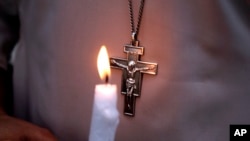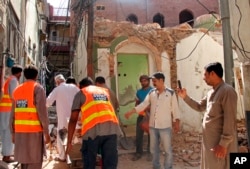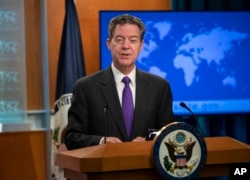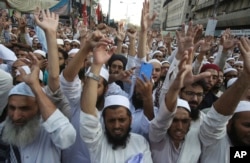Pakistan is denouncing a U.S. decision to place it on a list of countries Washington says are the worst offenders of religious freedom.
“Pakistan does not need counsel by any individual country how to protect the rights of its minorities... there are serious questions on the credentials and impartiality of the self proclaimed jury involved in this unwarranted exercise,” the Foreign Ministry said Wednesday in a strongly-worded statement.
The reaction comes a day after Secretary of State Mike Pompeo announced his designation of “countries of particular concern” that allegedly have engaged in or tolerated ”systematic, ongoing, and egregious violations of religious freedom.”
The countries on the blacklist are exposed to punitive sanctions, but Pompeo waived them for Pakistan, citing U.S. national interests.
Pakistan had until now been on a U.S. watch list for governments that have “engaged in or tolerated” severe violations of religious freedom.
While rebuking Tuesday’s U.S. pronouncement as “unilateral and politically motivated,” the Pakistani Foreign Ministry noted Pakistan is “a multi-religious and pluralistic society” of more than 200 million people, mostly Muslims.
“Around four percent of our total population comprises citizens belonging to Christian, Hindu, Buddhists and Sikh faiths. Ensuring equal treatment of minorities and their enjoyment of human rights without any discrimination is the cardinal principle of the Constitution of Pakistan,” it said.
Ahmadis most persecuted community
The statement did not mention the Ahmadi sect, which critics say is the most persecuted minority in Pakistan. The constitution bars the community from “posing as Muslims” and from calling their worship places "mosques."
U.S. Ambassador at Large for International Religious Freedom Sam Brownback while defending downgrading of Pakistan reiterated Tuesday the challenges facing the Ahmadi community.
“The Pakistani government criminalizes the identification of Ahmadis as Muslims, and then also — and this one has really been difficult and troubling for a lot of people — the government often fails to hold accountable perpetrators of killings and violence against members of religious minorities targeted on account of their religious beliefs or affiliations,” said Brownback.
Blasphemy laws
He cited, among other things, Pakistan’s blasphemy laws as a cause for the downgrade of the country’s religious freedom ranking. The laws prescribe the death penalty for those found guilty.
Rights groups have long complained Islamist groups misuse the law to intimidate minorities in the country.
Insulting Islam or its prophet is an extremely sensitive issue in Pakistan where mere allegations have led to mob lynchings. A former provincial governor, a federal minister, judges and lawyers are among those assassinated in Pakistan by extremists merely for calling for reform of the blasphemy laws to prevent their misuse or for hearing cases and defending alleged blasphemers.
Asia Bibi
In a historic judgement this past October, Pakistan’s Supreme Court acquitted a Christian woman, Asia Bibi, who had been on death row for eight years after being convicted of insulting the Prophet Mohammad. The women denied the charges from the outset as an outcome of a local feud and the country’s highest court cited lack of evidence in overturning her conviction by a lower court.
Bibi and her family have been in hiding since her release. Her lawyer fled Pakistan shortly after the landmark court ruling announced on October 31, saying his life was in danger.
Bibi is awaiting a rehearing of her case by the Supreme Court and is residing in a safe place under government protection, say Pakistani officials.
Pakistan also arrested hundreds of Islamist activists and their leaders last month for staging days of mass violent protests to denounce the court for freeing Bibi.
The government has charged the detainees with treason and terrorism and officials have vowed to put them on trial in special courts.
“It’s our hope that they will, the new leadership in Pakistan, will work to improve the situation. There was some encouraging signs seen recently on how they’ve handled some of the recent protesting against the blasphemy laws, and we continue to watch very carefully what’s happening to Asia Bibi,” said Brownback.
China, Eritrea, Iran, Myanmar, North Korea, Sudan, Saudi Arabia, Tajikistan and Turkmenistan are also included in the U.S. list of countries accused of committing severe violations of religious freedom.









